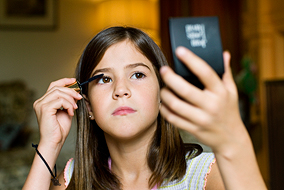
Undergrad study explores the evolution of “girl power” and its messages for young girls - photo by Martin Dee UBC Reports | Vol. 54 | No. 9 | Sep. 4, 2008
The Rise of Girl Power
By Lorraine Chan
The question of girl power for a sociology study earned UBC student Katherine Lyon newfound confidence as a scholar and a spot in a leading graduate program.
Lyon credits her undergraduate honours thesis on the Spice Girls and Pussycat Dolls for her academic readiness. Slated to receive her BA Honours from UBC in November, Lyon has already moved to the University of Toronto to begin her MA in sociology and women and gender studies.
What got her there, she says, was her fourth-year independent research project, a 37-page thesis titled Empowering Representations of Femininity?: Girl Power, Sexuality and Physical Appearance in Popular Western Music.
Lyon compared two recording successes, the Spice Girls and the Pussycat Dolls, a burlesque act turned music and performance group. She analyzed lyrics, music videos, photos and media coverage, and in the case of the Spice Girls, read through numerous academic studies.
Lyon traced the arc of commercialized “girl power” from the mid 1990s when the Spice Girls first appeared to the 2005 rise of the Pussycat Dolls. She found a stark difference in how the two groups depict female strength. While the Spice Girls sing about harmony and working together, the Pussycat Dolls emphasize hierarchy and competition.
The in-your-face sexuality of the Pussycat Dolls provokes reactions from “they’re disgusting to they’re cool and in control,” says Lyon, who prefers not to dismiss or demonize the group.
“In my study, I don’t judge who’s good or who’s bad. For example, the Pussycat Dolls have some positive messages about taking control,” she says, adding, “I don’t want to contribute to the sentencing and policing of what girls can do.”
Her paper points out that corporate interests -- mostly male-dominated -- continue to present limited and stereotypical ideals of beauty. “These images serve to create insecurities in young women, which has been a fundamental part of our society and consumption-based economy.”
Lyon had the opportunity to discuss her findings with 100 professors, peers and community members at a panel on undergraduate research during the 35th anniversary celebrations for the UBC Centre for Women’s and Gender Studies in the spring.
As well, Lyon presented her research at the UBC Multidisciplinary Undergraduate Research Conference earlier this year. She was selected as one of seven winners for her oral presentation.
At the U of T, Lyon will build on this UBC foundation. She plans to investigate other facets within girl studies, particularly among “tweens,” female preadolescents roughly between the ages of 8 and 12 years.
“This is an under-researched area since many previous studies have treated youth as a gender-neutral experience ” says Lyon, who will explore how girls navigate the onslaught of contradictory images and messages from media and society.
“It’s a very confusing time for young women with all the different pressures and roles they’re expected to fill as students, daughters and friends, among other things,” observes Lyon. “It’s also a challenging time when girls begin to develop more mature and complicated conceptions of themselves.”
Her own childhood experience as a Spice Girls fan was one of the reasons Lyon wanted to peel back some of the layers informing popular culture.
“I thought the whole idea of girl power was kind of neat,” says Lyon. “I felt empowered and didn’t think to question the concept at the time. Looking back, I am now interested in analyzing the notion of girl power and considering its underlying ideologies.”
What helped Lyon arrive at these insights were the one-on-one discussions with her thesis supervisor, Amy Hanser, an assistant professor in the Dept. of Sociology.
“Doing numerous thesis drafts with her feedback was really valuable since it forced me to revisit and think through my ideas,” says Lyon.
Through the thesis process, students must conceive of a research question, decide how to approach it, do some independent research -- which can involve interviews or other original data gathering -- and put it all together in a final analysis. The Sociology Dept. typically enrolls about 80 students in fourth-year with eight to ten opting for the honours program.
Hanser has supervised four senior honours research projects since her arrival at UBC in 2005. Students’ topics range from young men’s views on metrosexuality to how newspapers report on disease and illness.
Hanser says the benefits are enormous for those students willing to stretch themselves “and take on what mature scholars do on a regular basis.”
“I have seen some very impressive work,” says Hanser, “that moves well beyond the kind of synthesis work that courses often require to some very original and critical analysis.” |
